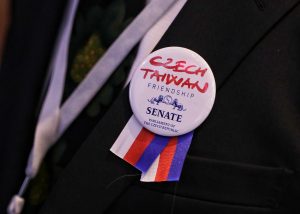A delegation from Czechia concluded a visit to Taiwan on Friday and vowed to overcome threats by China’s foreign minister, Wang Yi, who said this week Czech Senate President Milos Vystrcil would pay a “heavy price” for his visit to the country.
In a speech to Taiwanese lawmakers on Tuesday, Vystrcil channeled U.S. President John F. Kennedy’s 1963 visit to Berlin in saying “I am Taiwanese,” prompting Wang to say the Senate president had “crossed a red line” by visiting Taiwan and challenging Beijing’s “one China policy.”
Kennedy, Vystrcil said, had “used the phrase ‘Ich bin ein Berliner’ to show his support for the people of Berlin and the highest values of freedom.”
“Maybe I can be more humble, but allow me to use the same determined phrase to conclude my speech in your country’s parliament, in Taiwan: I am Taiwanese,” he said, delivering the final phrase in Mandarin.
Prague Mayor Zdenek Hrib invoked the speech in his own comments on Friday, mentioning he had received an honorary Taipei citizenship and saying: “If I would say I am a Taipei citizen, that would not be a political support message. It would be rather a description of reality.”
Hrib shrugged off opposition from his country’s Beijing-friendly president, Milos Zeman, to forge a Taipei-Prague sister city agreement in January, leading Shanghai to cut its own sister city ties with the Czech capital.
The idea of a trip to Taiwan originated with late Czech Senate leader Jaroslav Kubera, who passed away on January 20. His family later said he had been threatened by the Chinese embassy in Czechia over the trip, and claimed that the stress placed on him by Beijing contributed to his passing.
His successor, Vystrcil, led an 89-member Czech delegation to Taiwan this week. They entered the country after testing negative for COVID-19 upon arriving at the airport. Like the August delegation led by United States Secretary of Health and Human Services Alex Azar, they did not have to undergo mandatory 14-day quarantines.
But Vystrcil, much like his predecessor, quickly found himself subject to Chinese threats from Wang on both Monday and Tuesday, following his speech in Taiwan’s legislature.
He told Taiwan’s state-run Central News Agency on Friday the comments left him “scared” but that “courage is about overcoming these fears and concerns.” His visit to Taiwan should not be interpreted as a stance against China, he stressed.
“I do not feel like I crossed the ‘red line’ whatsoever, because I think we didn’t do anything that infringed the ‘one China’ policy,” Vystrcil said Thursday in response to Wang’s earlier comments, adding that every country interprets its ‘one China’ policy differently.
The president of Slovakia, along with the foreign ministers of France and Germany, offered statements of support for the Czech Senate president.
“Slovakia stands by the Czech Republic,” President Zuzana Caputova tweeted. “Threats directed at one of the EU members and its representatives contradict the very essence of our partnership and as such are unacceptable.”
Czech Foreign Minister Tomas Petricek had called Wang’s comments “over the edge” in his own tweet and said they “do not belong in the relations between the two sovereign countries.”
The Czech visit emphasized Taiwan’s growing efforts to deepen unofficial ties with non-allied nations and to build ties with non-state entities. Taiwan has 15 formal diplomatic allies, including the Vatican City, and has no country-to-country ties with the Czechia.
U.S. Health and Human Services Secretary Alex Azar led a delegation to Taiwan last month, after which talks of a Taiwan-U.S. bilateral trade agreement have started to heat up.
Taiwan also opened a representative office in Somaliland, an East African nation unrecognized by any United Nations member, although it has not formally recognized Somaliland.
Both moves also angered China, which continues to regularly fly military aircraft near Taiwanese airspace.

































